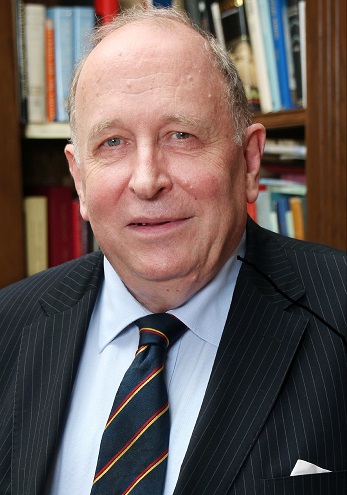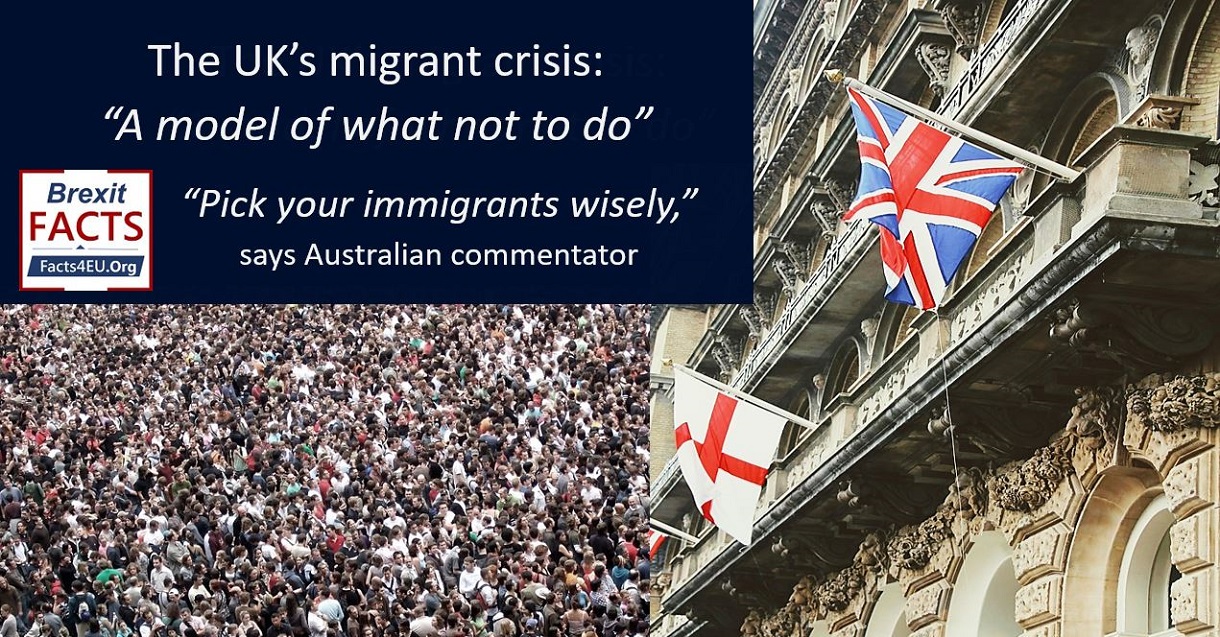The UK’s migrant crisis: “A model of what not to do”
“Pick your immigrants wisely,” says Australian commentator
Montage © Facts4EU.Org 2025
Brexit Facts4EU presents a view from the other side of the World
We begin the month with a guest article by an Australian commentator. We invited him to give readers his views on any aspect of life in the United Kingdom and he chose the one below.
In his piece below, he uses a review of a book as it expresses much of his own views on the subject in question.
Pick your immigrants wisely
By Antony Carr
Antony Carr comes from a background in accounting and corporate consultancy and lives in Sydney, Australia. An Australian citizen, he was born in New Zealand of a New Zealand father and an Australian mother, both of whom were descendants of early settlers hailing from the United Kingdom. He is a former Director of The Australasian Pioneers’ Club.

Earlier this year I read a book entitled, 'The Culture Transplant - How Migrants Make the Economies They Move To a Lot Like the Ones They Left', by Professor Garett Jones, Professor of Economics at George Mason University, a public research university in Virginia, USA. [Note from F4EU: We have linked to the publisher, Stanford University Press.]
In a review of the book that led to me to buy it, Daniel Pipes, a former professor and commentator on foreign policy and the Middle East, writes as follows: [Note from F4EU: We have linked to the site of this historian and columnist for The Washington Times.]
"Jones argues that "the shadow of the past is transmitted through culture to shape the diverse economies we see around the world today." He cites the case of Argentina, which went from one of the richest countries to a poor one, as an example of immigration drastically changing political ideas and economic institutions. Focusing on levels of trust ("a critical ingredient in the nation's prosperity recipe"), he notes the persistence of patterns of trust or mistrust unto the fourth generation.
"In his words, "immigration, to a large degree, creates a culture transplant, making the places that migrants go a lot like the places they left. And for good and for ill, those culture transplants shape a nation's future." Further, "some countries are more likely than other countries to export the kind of attitudes that build a nation's prosperity."
"While Jones limits himself to economic growth, cultural traits undoubtedly have a comparable longevity when it comes to other aspects of life as well, such as attitudes about gender, religion, and politics. The moral is simple: control your border and pick your immigrants wisely. And woe to those who do not."
Jones argues that research shows that where people are located geographically is far less important than their culture. People with a background history of settled agriculture and organised governance do better than those without these advantages. However, the prime factor predicting a society’s economic success is its technological history. This conclusion is supported by numerous researchers who used statistical analysis involving sometimes millions of regressions.
He noted that the Chinese rate highly in many key factors for economic success and wherever they went in Asia they not only became more prosperous themselves but increased the overall prosperity of the societies to which they migrated.
However, diversity is not a strength at the coal face. The book recounts research (by economist Jonas Hjort) on ethnic conflict within the Kenyan flower industry, where workers are paid on a per unit produced basis. The two principal ethnic groups in Kenya are the Kikuyu and the Luo, tribes that have had numerous conflicts over the years. Hjort’s research showed that a two-person flower processing team made up of a Luo tribe member and a Kikuyu tribe member was on average five percent less productive than a team made up of two members from either tribe and eight percent less productive in times of ethnic tension.
Here’s a quote from the book’s concluding chapter:
"If the next hundred years is at all like the last hundred — or the last five hundred — we can predict that year after year of massive immigration from the world’s poorest countries into the I-7, the world’s most innovative nations, would eventually tend to have effects like these:
- The quality of government would fall; corruption would rise.
- Social conflict would increase—and so would the risk of civil war.
- Trust—and probably trustworthiness—toward strangers would decline.
- Support would rise for higher minimum wages and laws making it harder to fire workers.
- Innovation would decline overall, and since new innovations eventually spread across the entire planet, the entire planet would eventually lose out.
"The final result of this kind of decades-long immigration wave: average incomes in the I-7 would be lower than if that massive wave of immigration had never happened, and there would be a world of slower, more sluggish growth in new science, new technology."
- Jones, Garett. The Culture Transplant: How Migrants Make the Economies They Move To a Lot Like the Ones They Left (pp. 157-158). Stanford University Press. Kindle Edition.
UK’s system of government a model to follow? No longer
In years gone by, the United Kingdom’s system of government was seen as a model to follow. For example, the Hungarian Parliament Building in Budapest, completed in 1904, which I inspected in May this year, was constructed in a neo-Gothic style that was inspired by the Palace of Westminster as leading Hungarian politicians of that time regarded Britain as a political role model. Today Britain provides a model of what not to do.
The catastrophe arising from mass immigration now enveloping the United Kingdom is the inevitable result of the lack of wisdom shown by its political, bureaucratic, academic, cultural and business elites, who have repeatedly ignored, denigrated and sought to supress what they consider to be the unacceptable views of many of their fellow citizens.
The United Kingdom – A warning to the world
Many throughout the world now believe that the native people of England have been betrayed; that they are being dispossessed of their land and their national identity stripped from them. The erection of St George and Union flags everywhere represent claims to territory; British people are saying to the invaders: “This is our land, not yours, and we are taking it back!” If the rights they seek cannot be obtained democratically, the only choices remaining will be either flight, surrender or revolt.
Traditionally, the English have emphasised individual rights rather than group rights; they have not been a tribal people. While, using David Goodhart’s terminology, the ‘Anywheres’ will flee, the ‘Somewheres’ will stay and if unassimilable groups are not expelled, tribalism reminiscent of The Troubles in Northern Ireland will emerge but on a vastly greater scale.
The United Kingdom today provides a warning to the world – this is what happens when a nation fails to pick its immigrants wisely.
Please help us to keep going with a donation today. We rely wholly on patriotic members of the public to survive. And/or, please also consider joining Stand for our Sovereignty. The more Members they have, the louder their voice in Westminster!
Don't leave this to someone else. You are that 'someone else'.
Observations
In the course of our work we communicate with people and organisations all over the world. Increasingly, it is the migrant crisis in the UK which has been the one we have been asked about most.
When we invited Mr Carr to write for us, we gave him carte blanche as to his subject matter and perhaps unsurprisingly he decided to give us his take on an aspect of immigration which has perhaps not been aired as fully as it might.
In recent years Australia has had its own debates on immigration and only this weekend marches took place in the cities of every state across that vast country. The few reports we have read in the British press and from the BBC have generally employed the phrase ‘neo-Nazi’ in their headlines or leading paragraphs, copycatting the approach taken by the predominantly Establishment Australian media.
What we can tell readers is that we have spoken to contacts in Australia who attended marches and they typically laughed at this characterisation. Needless to say, none of our contacts around the World are extremists in any way. We have been told that the vast majority of marchers were just normal, moderate people who have serious concerns. In fact, our contacts could easily have been describing the protests taking place in the UK concerning migrant hotels.
Please, please help us to carry on our vital work in defence of independence, sovereignty, democracy and freedom by donating today. Thank you.
[ Sources: A Carr, Sydney, Australia ] Politicians and journalists can contact us for details, as ever.
Brexit Facts4EU.Org, Mon 01 Sept 2025
Click here to go to our news headlines
Please scroll down to COMMENT on the above article.
And don't forget actually to post your message after you have previewed it!
Since before the EU Referendum, Brexit Facts4EU.Org
has been the most prolific researcher and publisher of Brexit facts in the world.
Supported by MPs, MEPs, & other groups, our work has impact.
We think facts matter. Please donate today, so that we can continue to ensure a clean Brexit is finally delivered.
Paypal Users Only - Choose amount first
Quick One-off
Monthly





Something to say about this? Scroll down for reader comments